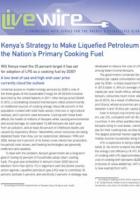Publications
Adoption of liquefied petroleum gas (LPG) as a clean cooking solution is lagging behind Kenya's 2030 development goal, despite several government initiatives along the LPG value chain. Until now, the government's strategy focused on reducing the cost of LPG and increasing its use among lower-income Kenyans.
Sustainable uptake may be accelerated by taking vigorous regulatory steps to reduce the consumer price and minimize unlicensed LPG sales. Some measures include reviewing the economics underpinning the intervention, creating an enabling environment for LPG adoption by upper- and middle-income groups, developing annual uptake targets, and devising a better metric to measure progress.
van den Berg, Inge C.. 2018. Kenya's Strategy to Make Liquefied Petroleum Gas the Nation's Primary Cooking Fuel. Live Wire;2018/89. World Bank, Washington, DC. © World Bank. License: CC BY 3.0 IGO. https://openknowledge.worldbank.org/handle/10986/30391
